Over time, pragmatics played an increasingly important role in different areas of language study. A particularly interesting instance of language use in this matter is translation. Thus, the decision to discuss the relation between pragmatics and translation came up. More precisely, the influence of a specific pragmatic field, namely Relevance Theory, on the study of translation will be analyzed below.
It begins with a brief look into the history of translation studies and the reason why it is possible for pragmatic concepts to be applied to the study of translation. The most fundamental concept in connection to the respective study is Relevance Theory
which was developed by Dan Sperber and Deirdre Wilson. A general overview of the theory will introduce the examination of this part of the research. It is mostly based on Sperber and Wilson’s work Relevance: Communication & Cognition (1995).
Which role the relevance-theoretic notion plays with regard to translation will then be studied. In terms of translation and relevance, the efforts of Ernst-August Gutt are of major interest with his book Translation and Relevance: Cognition and Context (2000) being of primary attention.
This chapter will furthermore focus on a few selected relevance-theoretic concepts. It starts with the notion of optimal relevance and continues with investigating the interpretive use of language in translation.
Finally, my goal is to make use of the relevance-theoretic approach to translation by applying the respective concepts to an example. This will be the core area of the paper. The analysis is made up of scrutinizing a translated version of an online newspaper article from the UK edition of the Huffington Post with German as the target language. The article is about the British author J.K Rowling criticizing a supporter of the withdrawal of the United Kingdom from the European Union, better known as Brexit, in a referendum.
Inhaltsverzeichnis (Table of Contents)
- Introduction
- Role of Pragmatics in Translation
- Relevance Theory in Translation
- Relevance Theory: An Overview
- Concepts of Relevance Theory
- Optimal Relevance
- Loose Use of Language
- Narrow Use of Language
- Relevance Theory: A Context-Based Analysis
- Conclusion
Zielsetzung und Themenschwerpunkte (Objectives and Key Themes)
This paper examines the influence of Relevance Theory, a specific pragmatic field, on the study of translation. It delves into the historical development of translation studies and explains why pragmatic concepts are applicable to this field. The paper also explores the role of Relevance Theory in translation, focusing on concepts such as optimal relevance and the interpretive use of language. Finally, it analyzes a translated version of an online newspaper article to demonstrate the practical application of Relevance Theory to translation.
- The historical development of translation studies
- The applicability of pragmatic concepts to translation
- Relevance Theory and its role in translation
- Concepts of Relevance Theory such as optimal relevance and interpretive use of language
- The application of Relevance Theory to a real-world translation example
Zusammenfassung der Kapitel (Chapter Summaries)
- Introduction: The paper introduces the topic of pragmatics and its role in translation, specifically focusing on Relevance Theory. It outlines the scope of the study and highlights the key concepts and figures involved.
- Role of Pragmatics in Translation: This chapter discusses the importance of considering pragmatic principles for successful translation. It emphasizes the context-dependent nature of translation and the shift from a code-based to an inferential model of communication. The chapter highlights the contributions of Paul Grice and Ernst-August Gutt in establishing the link between pragmatics and translation.
- Relevance Theory in Translation: This chapter delves into Relevance Theory, explaining its theoretical framework and its application to translation. It examines the limitations of Grice's approach and highlights the strengths of Relevance Theory in addressing the complexities of communication. The chapter also introduces the concept of informative intention and its role in conveying meaning.
- Relevance Theory: A Context-Based Analysis: This chapter explores the practical application of Relevance Theory to translation. It analyzes a specific translation example, focusing on the relevance-theoretic concepts discussed earlier. The analysis aims to demonstrate how the theory can be used to understand and interpret translated texts.
Schlüsselwörter (Keywords)
The main keywords and focus topics of the text include pragmatics, translation, Relevance Theory, optimal relevance, interpretive use of language, informative intention, context, communication, and inferential model.
- Quote paper
- Bünyamin Yuvarlak (Author), 2016, Pragmatics and Translation: A Relevance-Theoretic Approach, Munich, GRIN Verlag, https://www.grin.com/document/998170



